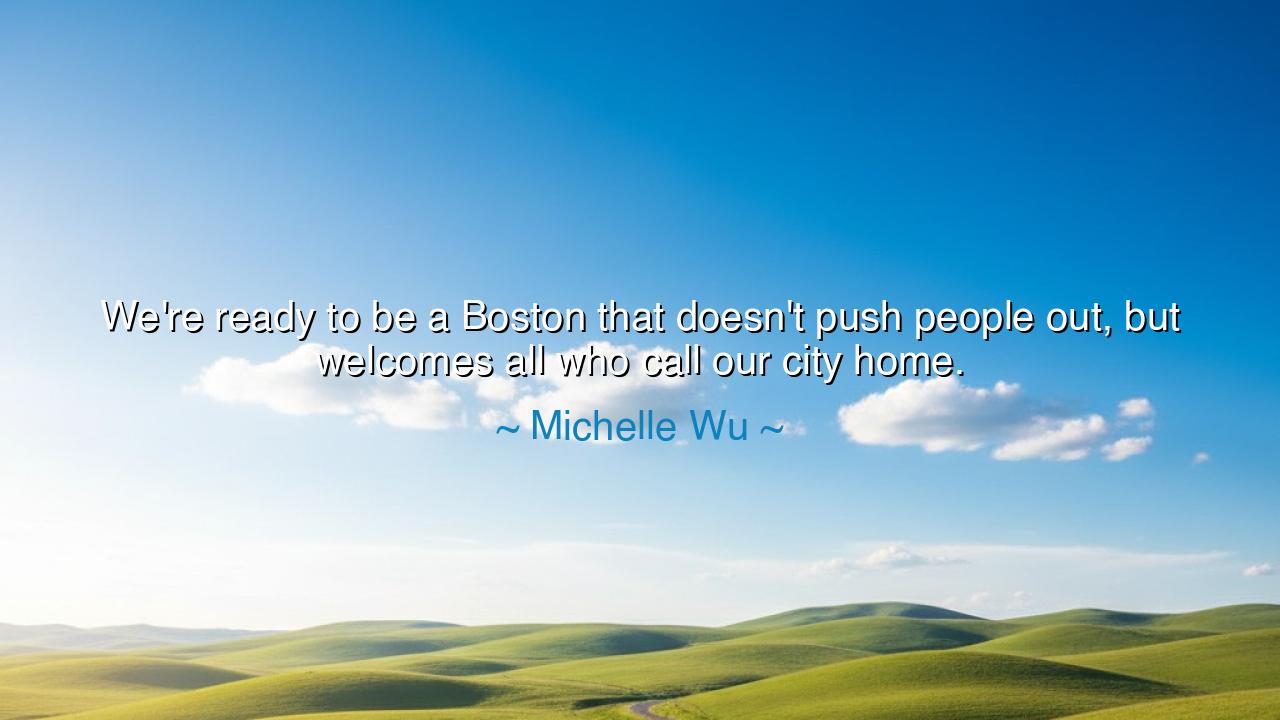
We're ready to be a Boston that doesn't push people out, but
We're ready to be a Boston that doesn't push people out, but welcomes all who call our city home.






In the stirring words of Michelle Wu, the Mayor of Boston, we hear both a call and a promise: “We’re ready to be a Boston that doesn’t push people out, but welcomes all who call our city home.” Though these words were spoken in the modern age, they carry the soul of ancient wisdom — a vision of justice, belonging, and renewal. Her declaration rises not merely as policy, but as prophecy: that a city, like a heart, must grow not by exclusion but by embrace. In her voice echoes the cry of every generation that has sought to turn walls into bridges and fear into fellowship.
To welcome all is one of humanity’s oldest virtues. In the ancient world, hospitality was not a courtesy — it was sacred law. Among the Greeks, it was called xenia, the divine command of Zeus Xenios, protector of strangers. To close one’s doors to the wanderer was to invite the wrath of the gods. In that spirit, Michelle Wu’s vision reawakens an ancient moral truth: that a city’s greatness is not measured by its towers or wealth, but by the warmth of its welcome — by how it treats the vulnerable, the new, and the different. A city that opens its arms grows stronger in soul, even if its walls grow crowded.
The Boston she envisions stands as a symbol of transformation — a city once known for revolution, now called to a new kind of uprising: one of inclusion over isolation, of compassion over competition. Like the citizens of Athens, who rebuilt their city from ashes after war, she calls upon her people to rebuild their community from within — to make it a place not of displacement, but of belonging. “To not push people out,” she says — and in that simple phrase lies the pain of many modern cities, where progress too often means exile, and where prosperity too often forgets the poor. Her words are a reminder that growth without empathy is not progress, but decay disguised as success.
Consider the ancient story of Rome, that eternal city whose strength lay not in conquest alone, but in its power to absorb, to welcome. Rome thrived because it gave citizenship to the conquered, turning enemies into allies, strangers into Romans. It was unity, not uniformity, that made the empire great. But when Rome’s heart hardened — when the powerful grew fearful of the masses, when greed replaced grace — its glory dimmed, and its strength withered. So too does Wu’s warning echo across time: if a city ceases to care for its people, it will crumble, no matter how tall its skyline.
The origin of this quote lies in the struggles and hopes of Boston’s people — immigrants, laborers, students, and dreamers — who for generations have built the city’s foundation with their sweat and hope. Her words came as part of her vision for a Boston that could face its inequities — from housing to education to representation — and choose community over competition. She stands as part of a new lineage of leaders who see the city not as a fortress to guard, but as a garden to tend. In this, she restores to leadership its truest meaning: stewardship of the collective spirit.
But beyond Boston, her words speak to every city, every nation, every heart that must decide whether to fear difference or to embrace diversity. The tyranny of exclusion is subtle — it begins with indifference, with the comfort of distance. Yet the wise know that the fate of one is the fate of all. A city that drives away its poor will lose its soul; a nation that forgets compassion will forget itself. The path of renewal begins with the simple act of saying, “You belong.”
Let this be the lesson: to build community is the highest form of creation. To make space for another — in your city, your home, your heart — is to participate in the divine work of unity. Progress that does not include all is not progress at all, but a gilded cage. As Michelle Wu calls for a Boston that welcomes all, she calls also for a humanity that remembers its roots — that we are travelers together, bound by a shared longing for home.
Action to take: wherever you dwell, make your space a refuge. Welcome the stranger. Listen to the unheard. Support those who are pushed aside. Build a community that lifts rather than isolates, that includes rather than divides. For in the end, as Mayor Wu teaches, the truest measure of a city — or a life — is not in how high its towers reach, but in how wide its arms open. When we choose to welcome rather than to fear, we do not merely build a better city — we build a better world, one home at a time.






AAdministratorAdministrator
Welcome, honored guests. Please leave a comment, we will respond soon